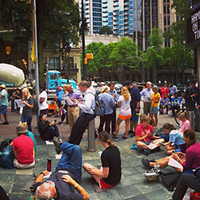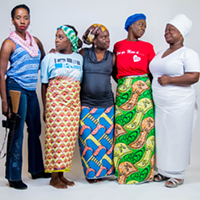This production reminds us what Rep can be at its best, bringing us a compelling, provocative work less than two years after its celebrated Off-Broadway run. The cast, a mix of local and out-of-town stalwarts, is tighter and better-rehearsed than the New York production, which featured a revolving set of celebs reading the roles.
Topping off Saturday night's sterling effort, Rep welcomed a true-life exoneree to Booth Playhouse, former police detective Jeffrey Scott Hornoff, who served more than six years of a life sentence for a crime he didn't commit. Upstaging the Off-Broadway show yet again.
So why the empty seats? Disaffection with the Rep and its overall 2004-05 lineup is probably the prime cause. Failure to adequately publicize Hornoff's one-night stand — or anticipate the electricity he would create — was another blunder. But the unlucky timing couldn't have helped.
Just eight days before Rep's opening, Court TV premiered a star-studded film version of the Drama Desk Award winner. If that weren't enough, an officer of the National District Attorneys Association raised questions about the veracity of Jessica Blank and Erik Jensen's script. Joshua Marquis, a county DA in Oregon, made a minor splash on cable, facing off against Barry Scheck on MSNBC and Court TV on successive days.
Adjudicating the flap in last week's Chicago Reader, Michael Miner confirms that there's a fine distinction between legal exoneration and accepting the "Alford plea" in exchange for release from prison. Two of the six Exonerated protagonists, Sonia "Sunny" Jacobs and Kerry Max Cook, took this route. Essentially they pleaded no contest to their murder charges without admitting guilt — and without tarnishing their prosecutors' conviction records.
Scheck vociferously denounced the Alford plea as a cynical face-saving device, but the most devastating chink in the Blank-Jensen armor may have come to light after Marquis's abortive talk show crusade. Turns out that Robert Earl Hayes, exonerated for the 1990 murder of a female groom at a Florida racetrack, pleaded guilty to manslaughter last November — of a female groom at a New York racetrack in 1987.
So-o-o-o-o... at the very least, Rep's "judge for yourself" slogan now means that we begin our quest for the truth at Booth Playhouse — supplementing that intimate experience with some outside reading.
Directing for the second time at Rep this season, Dave Mowers sets up his players with the same stark simplicity that characterized the New York staging. All of them remain seated throughout the performance behind lecterns and playscripts. Eric Winkenwerder's lighting design, relying heavily on spotlights, effectively rivets our attention on the actors. So effectively that I didn't catch any of the costume changes that were going on at the corners of the stage.
That adds a little of the extra spice you'll find in Rep's Exonerated. Mowers also demands more acting (and a lot less reading) from his actors than I saw at 45 Bleecker Street in 2002. Carl McIntyre's portrait of Kerry Cook and George Gray's rendition of Gary Gauger had noticeably more rustic flavor.
McIntyre dug into Cook so deeply that I remain convinced he did the right thing by accepting a deal before DNA testing conclusively proved his innocence. Branded a homosexual by an unscrupulous prosecutor, hideously scarred by his fellow prisoners, Cook can be excused for lunging at a chance for freedom after 22 years of unspeakable hell. That some small-time DA can't concede his innocence speaks volumes. Gray's take on Gauger is likewise useful in pointing up how he was coerced into playing the patsy.
A couple of apt reality checks: All of the Death Row vets except one are men, and three of the six liberated prisoners are black. Pam Galle brings all of her considerable luminosity to Sunny even as we're beginning to learn that the flower-child innocence of her self-portrait is largely myth. One of Galle's best moments comes when she insouciantly informs us that she was left to fester on Death Row for 16 years after her cohort renounced his plea-bargained testimony. A minute later, she stops the show by asking us to imagine a chunk that size taken out of our lives. Chilling.
All four of the black performers are making their Rep debuts. The guys are all impressive — and nicely individualized. As our de facto poet-narrator Delbert Tibbs, Evander Duck often performs in the chanting fashion of the poetry slam circuit, achieving a wry philosophical distance telling his own story. Playing the lapsed man of God, Paul Garrett audaciously breaks away from the reading stage conventions observed by the other actors, deteriorating suddenly before our eyes as David Keaton. Believe me, it works.
Latest in Feature
More by Perry Tannenbaum
Calendar
-
An Evening With Phil Rosenthal Of "Somebody Feed Phil" @ Knight Theater
-
Kountry Wayne: The King Of Hearts Tour @ Ovens Auditorium
-

NEW WINDOW GALLERY-Pat Rhea-ACRYLIC PAINTINGS-April 05-30 2024 VALDESE, NC 28690 @ New Window Gallery/Play It Again Records
- Through April 30, 12 p.m.
-

Trap & Paint + Karaoke @ Zodiac Bar & Grill
-

LIVE MUSIC FRIDAYS!!! @ Elizabeth Parlour Room
-
Susan Brenner Examines Upheaval While Celebrating Trees
Chaos and beauty
-
Fall Guide: Upcoming festivals, comedy shows, visual arts events and more
-
Failure To Communicate
Worthy play could use more nuance














